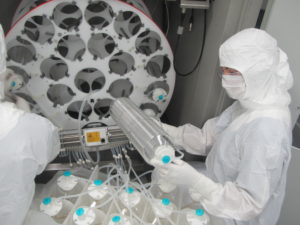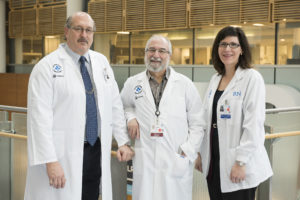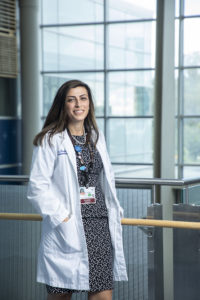The benefits of research in patient care and outcomes at the new campus

Thanks to The Ottawa Hospital’s unique Biotherapeutics Manufacturing Centre, novel experimental therapies can be made onsite and given to patients in adjacent clinics.
From stopping multiple sclerosis in its tracks with stem cells to diagnosing blood clots with artificial intelligence to targeting cancer with immunotherapy, researchers at The Ottawa Hospital are saving lives and redesigning the future of health care.
While the thought of research often conjures up images of test tubes and microscopes, at The Ottawa Hospital, patients and families are at the centre of more than 2000 research projects.
Some of these projects aim to improve our understanding of a disease, while others focus on developing experimental treatments. Still others focus on improving quality of life and finding ways to provide more seamless, integrated care for complex illnesses. But whether the research takes place in a lab, a clinic or on downtown streets, improving the health of patients and families is always the ultimate goal.
Unique success in bench-to-beside research

The collaborative research environment at The Ottawa Hospital means that experts working on different diseases regularly share results and develop new projects together. Blood cancer specialist Dr. Harold Atkins (middle), neurologist Dr. Mark Freedman (left) and advanced practice nurse Marjorie Bowman (right) pioneered a treatment that uses stem cells and chemotherapy to reboot the immune systems of people with certain kinds of multiple sclerosis. Today, this is accepted as a standard therapy around the world and patients across Canada regularly come to The Ottawa Hospital for this transformative treatment.
When The Ottawa Hospital’s cancer research labs were built more than 25 years ago, founder Dr. Michael McBurney had the radical idea that laboratory scientists and clinicians should work together. To accomplish this, the cancer research floor was built with alternating laboratory and clinical offices and shared spaces to foster collaboration. Physicians treating cancer patients were embedded in cancer research labs, and basic science trainees were given opportunities to join physicians on patient rounds.
Over the years, similar practices have been adopted in other areas of the hospital, resulting in a unique culture embodied by the hospital’s tagline “Inspired by research. Driven by compassion.”
Thanks to this unique culture, research teams at The Ottawa Hospital have been able to launch more than a dozen world-first clinical trials using experimental therapies developed right here at the hospital. Some use viruses and immune cells to fight cancer, while others use stem cells to repair damage from heart attacks, septic shock and even COVID-19. Thanks to The Ottawa Hospital’s unique Biotherapeutics Manufacturing Centre, these novel therapies can be made on-site and given to patients in adjacent clinics. No other hospital in Canada has had this level of success in taking research from the lab bench to the patient’s bedside.
Every patient is an inspiration

As one of Canada’s top research hospitals, The Ottawa Hospital is able to attract and retain the most talented and innovative clinicians. Dr. Darine El-Chaâr, a high-risk obstetrician and associate scientist, returned to The Ottawa Hospital after training The University of Toronto and Harvard Chan School of Public Health.
Whether because of an unusual symptom, a family history or even a drug that didn’t work, every patient can inspire the clinical team to learn more and make things better for the next patient.
Research is essential for driving constant learning and improvement in health care, but it isn’t always easy. That’s why The Ottawa Hospital has created the most comprehensive system in the country for helping clinicians turn their ideas into research studies that can make a difference for patients.
The hospital’s Ottawa Methods Centre is at the heart of this system. The Centre houses world-renowned experts in areas such as statistics, health economics, knowledge translation and patient engagement. These experts offer free consultations to any member of The Ottawa Hospital with a research idea – whether it’s a physician, surgeon, nurse, respiratory therapist or laboratory scientist. They also lead training courses, participate in research seminars and provide dedicated support to more than 200 research projects every year.
Thanks to the Ottawa Methods Centre and other core research support systems, The Ottawa Hospital has grown to become one of Canada’s top hospitals for research, with more than 2,000 researchers supported by nearly $120 million in annual funding. This research, which wouldn’t be possible without generous donations from the community, is saving lives and changing medical practice, not only in Ottawa, but around the world.
Once-in-a-lifetime opportunity
The new campus development offers an incredible opportunity to build a state-of-the-art hospital from the ground up, with research and learning integrated into every clinic, laboratory and office area. This once-in-a-lifetime opportunity will put our region at the forefront of the next revolution in medicine, with patient and families always at the centre.


